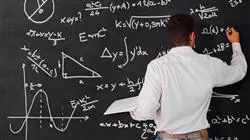University certificate
The world's largest faculty of education”
Introduction to the Program
A Postgraduate diploma that will enable excellent teaching in line with the most innovative and dynamic educational guidelines"

Mathematics is probably the most despised subject among students, especially in High School Education. The logical thinking it requires, as well as the complexity involved in their procedures, cause adolescents to reject it in the vast majority of cases, due to the use of antiquated and static teaching techniques. However, the development of metacognition in this area has enabled teachers to create comprehension-based learning projects.
It is a pedagogical strategy that has undoubtedly revolutionized teaching through its inclusion in educational syllabuses thanks to a myriad of tools and materials based on technological didactics. Based on this, if the graduate is interested in raising their classes to the highest level from the point of view of teaching in the 21st century, they can count on this Postgraduate diploma to achieve it. This university presents a program designed by a team versed in education and pedagogy that includes 450 hours of the best theoretical, practical and additional content and with which you will be able to work intensively on the most innovative foundations for teaching mathematics through metacognition and autonomous problem solving.
In this way, in just six months of 100% online study you will be able to implement in your practice the most effective educational tools, as well as the techniques that have had the best results so far. This is a program in which you will not only find the most exhaustive (innovative) syllabus, but you will also have access to dozens of hours of additional multidisciplinary material, to contextualize the information and delve in a personalized way in the different sections. In addition, there will be the participation of an outstanding International Guest Director, an expert with extensive research experience, who will offer exclusive and detailed Masterclasses focused on the latest innovations in Mathematics education.
Are you interested in specializing in teaching Mathematics? TECH will give you access to a unique and additional set of Masterclasses, taught by an internationally renowned teacher in this field”
This Postgraduate diploma in Metacognitive Learning in Mathematics contains the most complete and up-to-date program on the market. Its most notable features are:
- The examination of practical cases presented by experts in Mathematics teaching
- The graphic, schematic and practical contents of the book provide technical and practical information on those disciplines that are essential for professional practice
- Practical exercises where to carry out the self-assessment process to improve learning
- Its special emphasis on innovative methodologies
- Theoretical lessons, questions to the expert, debate forums on controversial topics, and individual reflection assignments
- Content that is accessible from any fixed or portable device with an Internet connection
A Postgraduate diploma with which you will revolutionize the teaching of Mathematics from metacognition and awareness of the different technical processes involved"
The program’s teaching staff includes professionals from the sector who contribute their work experience to this training program, as well as renowned specialists from leading societies and prestigious universities.
The multimedia content, developed with the latest educational technology, will provide the professional with situated and contextual learning, i.e., a simulated environment that will provide immersive education programmed to learn in real situations.
This program is designed around Problem-Based Learning, whereby the professional must try to solve the different professional practice situations that arise during the course. For this purpose, students will be assisted by an innovative interactive video system created by renowned experts.
You will have access to a catalog of generative topics related to Mathematics comprehension projects, so that you can avoid obstacles to learning and plan classes that are at the forefront of education"

The best program on the academic market to get you up to date on the most advanced learning theories in a 100% online way"
Why study at TECH?
TECH is the world’s largest online university. With an impressive catalog of more than 14,000 university programs available in 11 languages, it is positioned as a leader in employability, with a 99% job placement rate. In addition, it relies on an enormous faculty of more than 6,000 professors of the highest international renown.

Study at the world's largest online university and guarantee your professional success. The future starts at TECH”
The world’s best online university according to FORBES
The prestigious Forbes magazine, specialized in business and finance, has highlighted TECH as “the world's best online university” This is what they have recently stated in an article in their digital edition in which they echo the success story of this institution, “thanks to the academic offer it provides, the selection of its teaching staff, and an innovative learning method aimed at educating the professionals of the future”
A revolutionary study method, a cutting-edge faculty and a practical focus: the key to TECH's success.
The most complete study plans on the university scene
TECH offers the most complete study plans on the university scene, with syllabuses that cover fundamental concepts and, at the same time, the main scientific advances in their specific scientific areas. In addition, these programs are continuously being updated to guarantee students the academic vanguard and the most in-demand professional skills. In this way, the university's qualifications provide its graduates with a significant advantage to propel their careers to success.
TECH offers the most comprehensive and intensive study plans on the current university scene.
A world-class teaching staff
TECH's teaching staff is made up of more than 6,000 professors with the highest international recognition. Professors, researchers and top executives of multinational companies, including Isaiah Covington, performance coach of the Boston Celtics; Magda Romanska, principal investigator at Harvard MetaLAB; Ignacio Wistumba, chairman of the department of translational molecular pathology at MD Anderson Cancer Center; and D.W. Pine, creative director of TIME magazine, among others.
Internationally renowned experts, specialized in different branches of Health, Technology, Communication and Business, form part of the TECH faculty.
A unique learning method
TECH is the first university to use Relearning in all its programs. It is the best online learning methodology, accredited with international teaching quality certifications, provided by prestigious educational agencies. In addition, this disruptive educational model is complemented with the “Case Method”, thereby setting up a unique online teaching strategy. Innovative teaching resources are also implemented, including detailed videos, infographics and interactive summaries.
TECH combines Relearning and the Case Method in all its university programs to guarantee excellent theoretical and practical learning, studying whenever and wherever you want.
The world's largest online university
TECH is the world’s largest online university. We are the largest educational institution, with the best and widest online educational catalog, one hundred percent online and covering the vast majority of areas of knowledge. We offer a large selection of our own degrees and accredited online undergraduate and postgraduate degrees. In total, more than 14,000 university degrees, in eleven different languages, make us the largest educational largest in the world.
TECH has the world's most extensive catalog of academic and official programs, available in more than 11 languages.
Google Premier Partner
The American technology giant has awarded TECH the Google Google Premier Partner badge. This award, which is only available to 3% of the world's companies, highlights the efficient, flexible and tailored experience that this university provides to students. The recognition as a Google Premier Partner not only accredits the maximum rigor, performance and investment in TECH's digital infrastructures, but also places this university as one of the world's leading technology companies.
Google has positioned TECH in the top 3% of the world's most important technology companies by awarding it its Google Premier Partner badge.
The official online university of the NBA
TECH is the official online university of the NBA. Thanks to our agreement with the biggest league in basketball, we offer our students exclusive university programs, as well as a wide variety of educational resources focused on the business of the league and other areas of the sports industry. Each program is made up of a uniquely designed syllabus and features exceptional guest hosts: professionals with a distinguished sports background who will offer their expertise on the most relevant topics.
TECH has been selected by the NBA, the world's top basketball league, as its official online university.
The top-rated university by its students
Students have positioned TECH as the world's top-rated university on the main review websites, with a highest rating of 4.9 out of 5, obtained from more than 1,000 reviews. These results consolidate TECH as the benchmark university institution at an international level, reflecting the excellence and positive impact of its educational model.” reflecting the excellence and positive impact of its educational model.”
TECH is the world’s top-rated university by its students.
Leaders in employability
TECH has managed to become the leading university in employability. 99% of its students obtain jobs in the academic field they have studied, within one year of completing any of the university's programs. A similar number achieve immediate career enhancement. All this thanks to a study methodology that bases its effectiveness on the acquisition of practical skills, which are absolutely necessary for professional development.
99% of TECH graduates find a job within a year of completing their studies.
Postgraduate Diploma in Metacognitive Learning in Mathematics
Metacognition is defined as a way of modulating learning processes in an autonomous and schematic way. In a field as analytical and scholastically reluctant as mathematics, this theory of mind is a very valuable tool, since it allows students to focus their efforts, not on explicitly memorizing the steps to perform an algebraic operation, but on building thinking strategies that allow them to find and better internalize the information. Under this approach, TECH Global University has devised the Postgraduate Diploma in Metacognitive Learning in Mathematics, a path of professionalization in the educational area strengthened with the latest advances in pedagogy and technology, since it is a 100% online course that uses innovative teaching models such as the Relearning system. The 500 hours of study can be regulated at the applicant's convenience, where they will learn about memory, linguistic development and neuronal fundamentals, all under a mathematical approach. Are you looking to boost your career while transforming the classroom? TECH is the answer.
Specialize in metacognitive mathematics teaching
The aversion to mathematics in the school world is not a new issue; there is an evident complexity in transmitting a passion for numerical operations and not dying in the attempt. It is under this great academic challenge that pedagogical innovation is a key piece, since, without a paradigm shift in teaching, it is difficult to motivate students to find value in a factorial decomposition, a logarithm or a polynomial. At TECH we believe in transformation through knowledge, but, above all, through the way you interact with it. That is why we offer you this Postgraduate Diploma, a necessary complement to your studies if your goal is to become a teacher who leaves a transcendental mark on your students. We offer you flexible schedules, state-of-the-art multimedia content and access to forums with an outstanding group of experts. Add success to your future and reduce school discouragement by enrolling with us.







